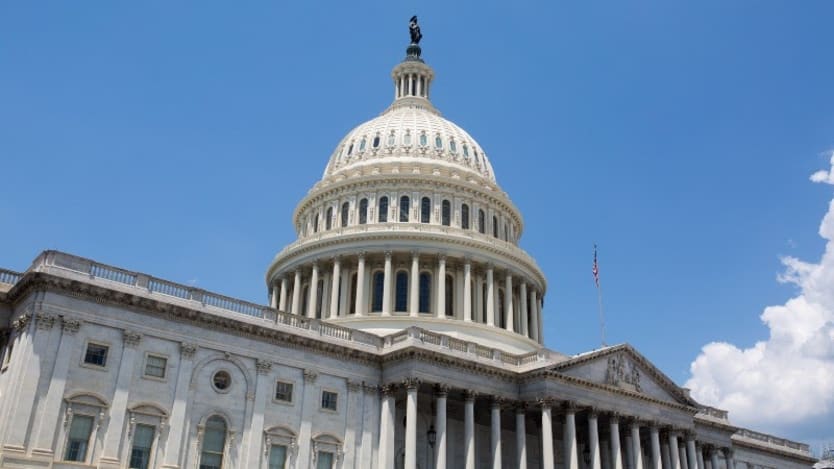US Senate Democrats introduce $9B international COVID-19 funding bill

WASHINGTON — A group of Senate Democrats introduced legislation Friday that would provide $9 billion for the global COVID-19 response and chart a more engaged course of action for the U.S.
To date, most U.S. COVID-19 legislation has focused on the domestic response, and aid advocates had been pushing for more global funding. They will see this bill as a positive step, though it falls short of the $12 billion that advocates had proposed.
But it is somewhat unlikely that the COVID-19 International Response and Recovery Act, or CIRRA, will pass the Senate in its entirety, especially because it includes language around refugees and funding for the United Nations Population Fund, which the administration of President Donald Trump has rejected in the past. It is more probable that part of the act could be included in another COVID-19 funding bill or tacked on to other, must-pass legislation, and having the text ready to go could expedite that process.
In addition to providing funds — including through large contributions to multilateral organizations — the legislation aims to reposition the U.S. role in the global response.
The bill states that the U.S. should “assert strong leadership in multilateral fora,” including the Group of 20, the United Nations, and other international and regional organizations, in an effort to “develop a comprehensive and coordinated response.”
The U.S. should elevate the role of multilateral institutions leading a robust response by providing financial support to U.N. agencies and support for the U.N.’s COVID-19 Global Humanitarian Response Plan, according to the legislation.
“A global, multilateral response is the strongest response to such a global threat,” said Sen. Ben Cardin, a Democrat from Maryland and one of the bill’s co-sponsors, in a statement. “In the absence of leadership from the White House, Congress must work in a bipartisan way to force the Trump administration to engage with other nations in a comprehensive manner that will save lives while benefiting both humankind and America’s national security.”
The bill calls for the immediate restoration of U.S. funding to the World Health Organization — which the Trump administration has frozen, pending an investigation into the agency’s COVID-19 response. The legislation would require the U.S. to pay its arrears from fiscal year 2019 and release fiscal year 2020 dues and voluntary funding but would also mandate the WHO director-general to commission an interim assessment conducted by a panel of independent experts on all aspects of the COVID-19 pandemic.
CIRRA, if passed, would authorize $2.8 billion in payments to the U.N. system, including $500 million for the U.N.’s COVID-19 Global Humanitarian Response Plan, $1 billion for The Global Fund to Fight AIDS, Tuberculosis and Malaria’s COVID-19 Response Mechanism, $4.4 billion to address global humanitarian needs, and $200 million for the Coalition for Epidemic Preparedness Innovations.
The act directs the White House to restore funding for the U.N. Population Fund, which the administration has cut off, citing the Kemp-Kasten amendment from 1985 prohibiting funding to any organization that “supports or participates in the management of a program of coercive abortion or involuntary sterilization.”
CIRRA also focuses on global health security, calling on the U.S. to introduce a U.N. Security Council resolution declaring COVID-19 and all pandemics a threat to international peace and security and requiring member states to “align their health preparedness frameworks with international best practices and those established by the GHSA [Global Health Security Agenda].”
“A global, multilateral response is the strongest response to such a global threat.”
— U.S. Sen. Ben CardinThe bill proposes the creation of a multidonor trust fund at the World Bank to “incentivize and support countries to develop and implement credible national action plans aimed at preventing, detecting and responding to epidemics and pandemics.” It would also establish a special adviser to the president for global health security who will be responsible for coordinating the U.S. government response and implementing the Global Health Security Agenda domestically and internationally.
In addition, CIRRA addresses the economic toll of the crisis and highlights the importance of the U.S. International Development Finance Corporation in the response, pushing the agency to accept more risk by funding projects that may have a lower financial return but could produce significant development gains.
CIRRA would also establish a new surge financing authority at DFC so that it can expedite decisions and speed strategic investments to aid in the coronavirus response and recovery.
The bill includes a directive to negotiate bilateral debt agreements, with an eye to selling, reducing, or canceling debt for countries that are struggling as a result of the pandemic; requirements around tracking and reporting on human rights violations as a result of the crisis; and authorization for the use of combatant commands to provide humanitarian or development assistance.
It also allows returned Peace Corps volunteers to file for unemployment benefits under the CARES Act and extends the timelines for delivering Millennium Challenge Corporation compacts.
Visit our dedicated COVID-19 page for news, job opportunities, and funding insights.

Search for articles
Most Read
- 1
- 2
- 3
- 4
- 5








